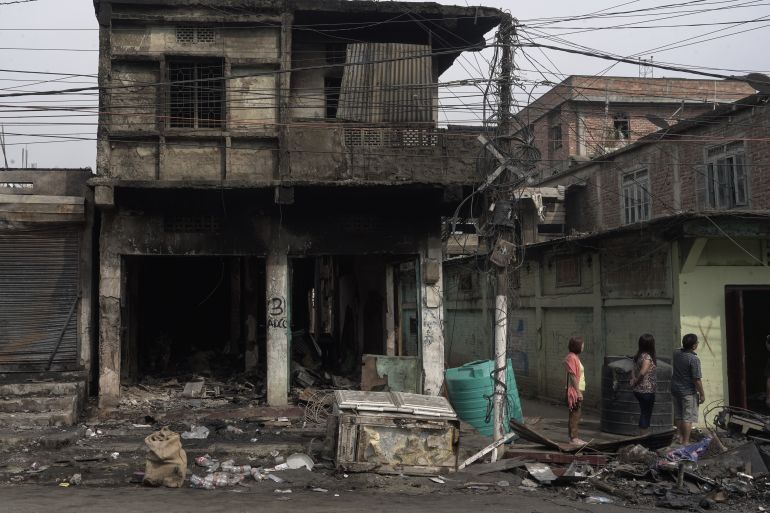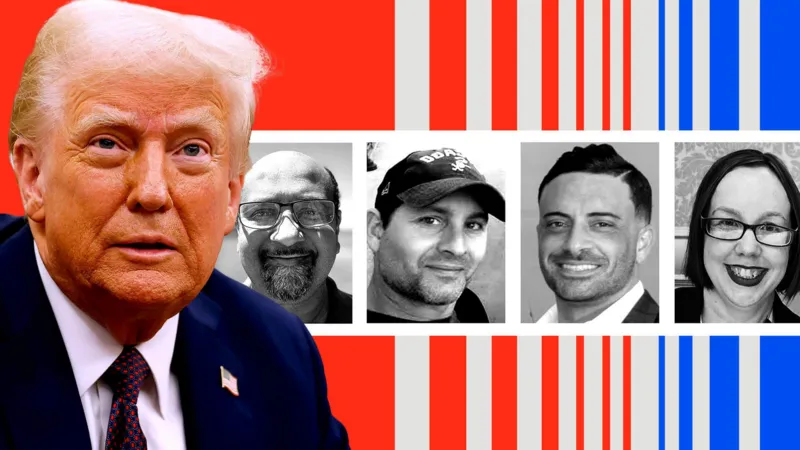‘Nothing left but ashes’: Indian state on edge after ethnic riots
While the ruling BJP claims the situation is under control and there are no further violence, army and paramilitary forces still patrol the streets.

Chiinlianmoi lies stretched at a government hospital in Churachandpur district of India’s Manipur state, struggling to move her body as doctors treat a bullet wound in her left thigh.
The 26-year-old looks visibly distraught as she narrates to Al Jazeera the tales of violence she witnessed earlier this month after ethnic riots broke out in the remote northeastern state.
On May 5, Chiinlianmoi was at her aunt’s home in Manipur’s Lamka town when a crowd gathered outside their residence and attacked it.
“The entire house was burned down. Nothing is left there but ashes,” Chiinlianmoi told Al Jazeera.
“I thought women would be spared but the mob were in a mood to kill whosoever came their way,” she added, pointing to a bullet wound on her thigh.
At least 60 people have been killed and more than 250 others injured since violence broke out in Manipur between the members of two ethnic groups, Kuki and Meitei, on May 2.
More than 1,700 buildings, including churches and Hindu temples, were burned during the ethnic violence that has displaced approximately 35,000 people.
The violence broke out after the Kukis began their protests against an order passed by the Manipur High Court directing the state government to consider including the Meiteis in the list of tribal communities in order to grant them benefits under India’s affirmative action programmes.
The Scheduled Tribe (ST) status, if granted, would enable the Meiteis – a predominantly Hindu community which forms more than half of Manipur’s population of three million – to secure reservations in government jobs and educational institutions.
India’s STs have traditionally been subjected to social and economic exclusion, and so seek special treatment to reverse the historic trends of discrimination.
But the Kukis, who are mostly Christian, say the Meiteis would receive the government benefits at their expense. The court’s order also triggered fears among Kukis that the Meiteis would now be allowed to acquire land in areas reserved for other tribal communities.
Chiinlianmoi, who is a Kuki, said she had never witnessed such hatred and violence between the two communities before.
“It seemed like everyone was trying to kill everyone,” she told Al Jazeera.
‘They had guns’
Manipur is a Himalayan state whose valley region and capital Imphal are primarily inhabited by the Meitei community, whereas the tribals, chiefly the Kukis, live in its hinterland and hilly areas.
However, there exist small pockets of land where people from both communities live in territories dominated by the other. Violence in such pockets has been high as the dominant groups have often attacked minorities.
Amy, 27, is a Kuki who lived in one such area in Khongsai Veng locality of Imphal East. She barely managed to save her life from a rampaging mob.
“We were like 300 people who were hiding inside a school in our locality. When the mob attacked us, I ran away from a narrow path behind the school. I don’t know what happened to many others,” Amy told Al Jazeera at Imphal airport as she prepared to flee the violence-hit state last week.
Amy said she took refuge along with hundreds of others in a school after their homes and the local church were attacked.
“They first burned our houses and then they stole everything – money, jewellery and everything. They also attacked the church and killed whosoever came their way. In my locality, five people have died. They had guns at their disposal,” she said.
“I don’t know where they got those guns from. I don’t know if it was the government supporting them.”
A doctor in a district hospital in Churachandpur confirmed to Al Jazeera that an unusually high number of patients had suffered bullet injuries during the violence.
“A high number of injuries are from firearms and that is really worrying,” he said.
In a news conference last week, Manipur’s Chief Minister N Biren Singh admitted that more than 1,000 guns were looted from the security personnel by the rioting mobs.
While the government claims the situation is now under control and there are no reports of further violence, the Indian army and paramilitary forces are still patrolling the streets and enforcing a curfew across the state, which is relaxed for a few hours every day.
Internet connectivity remains snapped in the state. Many families are reported to have fled to neighbouring Myanmar to save their lives.
Meanwhile, at least 10 tribal legislative members in the state assembly, seven of whom belong to the ruling Bharatiya Janata Party (BJP), have urged the federal government to provide the region with a “separate administration” in the wake of recent violence.
“As the state of Manipur has miserably failed to protect us, we seek from the Union of India a separate administration under the Constitution of India and live peacefully as neighbours with the state of Manipur,” the legislators said in a joint statement last week.
Government ‘inaction’
Robin from Churachandpur town in Manipur, who belongs to the Meitei community, also lost his home in the violence. “I am left with one pair of clothes now,” the 29-year-old told Al Jazeera.
“I have been living with the people from Kuki community since childhood but today our own friends and neighbours from the community attacked us. I don’t know what to say,” he said.
Robin said the violence could have been stopped had the security forces played their role in safeguarding the vulnerable people.
“Police were complicit in the violence. They were nowhere to be seen when our homes were attacked. The army and police both failed to safeguard us,” he said.
The opposition Congress party also alleged the Manipur violence was triggered by the negligence of the BJP.
“The BJP government has utterly failed to control the situation. It has been unable to stop the weapons from being looted or recover them once stolen, unable to rescue innocent people and unable to provide facilities to those in relief camps,” the party said in a statement.
Congress leader Bhakta Charan Das told Al Jazeera last week that the violence has not stopped despite the government’s claims.
“Even yesterday [Thursday], four people were killed. The arson has not stopped. There has been no serious action, simply deploying forces is not enough,” he said.
Responding to the allegation, K Sarat Kumar, a BJP leader in Manipur, told Al Jazeera the opposition is criticising the government “for the sake of criticism”.
“The situation is returning to normal. The administration is doing its work,” Kumar said.
But Das questioned why the federal government has been silent on the widespread violence in the BJP-ruled state.
“I don’t understand why the central government is silent on the issue. I can’t understand why the prime minister has not even tweeted on the issue. He has not expressed any grief nor does he have any sympathy for the people,” he said.
“There has been no action at all. Not even the home minister of the country has visited the affected areas. The central government has failed and the government of India has actually endorsed this [violence],” he added.
-al jazeera







